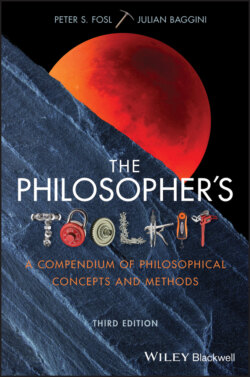Читать книгу The Philosopher's Toolkit - Julian Baggini, Julian Baggini - Страница 83
Certainty and validity
ОглавлениеIf you have a valid deductive argument, then its conclusion is often said to follow from the premises with certainty. Many inquirers, however, demand not only that conclusions follow with certainty but that the conclusions themselves be certainly true. Consider the difference between the following arguments:
1 If it rained last night, England will probably win the match.
2 It rained last night.
3 Therefore, England will probably win the match.
1 It’s certainly true that no parallel lines intersect.
2 These two lines are parallel.
3 Therefore, these two lines certainly do not intersect.
The conclusion of the first argument clearly enters only a probable claim. The conclusion of the second argument, in contrast to the first, enters a certain claim. But here’s the rub: both examples present valid deductive arguments. Both arguments possess valid forms. Therefore, in both arguments the conclusion follows with certainty – i.e. the truth of the premises guarantees the truth of the conclusion – even though the content of one conclusion enters merely a probable claim, while that of the other enters a claim of certainty.
You must therefore distinguish between (1) whether or not the conclusion of an argument follows from the premises with certainty or some probability, and (2) whether or not the conclusion of an argument advances a statement the content of which concerns matters of probability or certainty.
